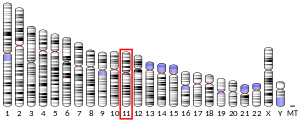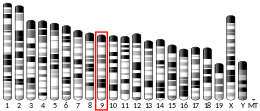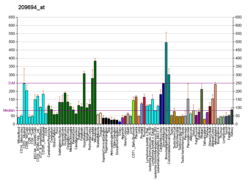PTS (gene)
6-pyruvoyltetrahydropterin synthase, also known as PTS, is a human gene which facilitates folate biosynthesis.[5]
See also
References
Further reading
- Werner ER, Werner-Felmayer G, Fuchs D, et al. (1991). "Biochemistry and function of pteridine synthesis in human and murine macrophages". Pathobiology. 59 (4): 276–9. doi:10.1159/000163662. PMID 1883524.
- Thöny B, Blau N (1997). "Mutations in the GTP cyclohydrolase I and 6-pyruvoyl-tetrahydropterin synthase genes". Hum. Mutat. 10 (1): 11–20. doi:10.1002/(SICI)1098-1004(1997)10:1<11::AID-HUMU2>3.0.CO;2-P. PMID 9222755.
- Thöny B, Auerbach G, Blau N (2000). "Tetrahydrobiopterin biosynthesis, regeneration and functions". Biochem. J. 347 (1): 1–16. doi:10.1042/0264-6021:3470001. PMC 1220924. PMID 10727395.
- Thöny B, Leimbacher W, Bürgisser D, Heizmann CW (1993). "Human 6-pyruvoyltetrahydropterin synthase: cDNA cloning and heterologous expression of the recombinant enzyme". Biochem. Biophys. Res. Commun. 189 (3): 1437–43. doi:10.1016/0006-291X(92)90235-D. PMID 1282802.
- Scriver CR, Clow CL, Kaplan P, Niederwieser A (1987). "Hyperphenylalaninemia due to deficiency of 6-pyruvoyl tetrahydropterin synthase. Unusual gene dosage effect in heterozygotes". Hum. Genet. 77 (2): 168–71. doi:10.1007/BF00272386. PMID 3308682.
- Oppliger T, Thöny B, Nar H, et al. (1996). "Structural and functional consequences of mutations in 6-pyruvoyltetrahydropterin synthase causing hyperphenylalaninemia in humans. Phosphorylation is a requirement for in vivo activity". J. Biol. Chem. 270 (49): 29498–506. doi:10.1074/jbc.270.49.29498. PMID 7493990.
- Ashida A, Owada M, Hatakeyama K (1995). "A missense mutation (A to G) of 6-pyruvoyltetrahydropterin synthase in tetrahydrobiopterin-deficient form of hyperphenylalaninemia". Genomics. 24 (2): 408–10. doi:10.1006/geno.1994.1642. PMID 7698774.
- Thöny B, Leimbacher W, Blau N, et al. (1994). "Hyperphenylalaninemia due to defects in tetrahydrobiopterin metabolism: molecular characterization of mutations in 6-pyruvoyl-tetrahydropterin synthase". Am. J. Hum. Genet. 54 (5): 782–92. PMC 1918260. PMID 8178819.
- Thöny B, Heizmann CW, Mattei MG (1994). "Chromosomal location of two human genes encoding tetrahydrobiopterin-metabolizing enzymes: 6-pyruvoyl-tetrahydropterin synthase maps to 11q22.3-q23.3, and pterin-4 alpha-carbinolamine dehydratase maps to 10q22". Genomics. 19 (2): 365–8. doi:10.1006/geno.1994.1071. PMID 8188266.
- Ashida A, Hatakeyama K, Kagamiyama H (1993). "cDNA cloning, expression in Escherichia coli and purification of human 6-pyruvoyl-tetrahydropterin synthase". Biochem. Biophys. Res. Commun. 195 (3): 1386–93. doi:10.1006/bbrc.1993.2197. PMID 8216273.
- Liu TT, Hsiao KJ (1996). "Identification of a common 6-pyruvoyl-tetrahydropterin synthase mutation at codon 87 in Chinese phenylketonuria caused by tetrahydrobiopterin synthesis deficiency". Hum. Genet. 98 (3): 313–6. doi:10.1007/s004390050213. PMID 8707300.
- Kluge C, Brecevic L, Heizmann CW, et al. (1996). "Chromosomal localization, genomic structure and characterization of the human gene and a retropseudogene for 6-pyruvoyltetrahydropterin synthase". Eur. J. Biochem. 240 (2): 477–84. doi:10.1111/j.1432-1033.1996.0477h.x. PMID 8841415.
- Hanihara T, Inoue K, Kawanishi C, et al. (1997). "6-Pyruvoyl-tetrahydropterin synthase deficiency with generalized dystonia and diurnal fluctuation of symptoms: a clinical and molecular study". Mov. Disord. 12 (3): 408–11. doi:10.1002/mds.870120321. PMID 9159737.
- Oppliger T, Thöny B, Kluge C, et al. (1997). "Identification of mutations causing 6-pyruvoyl-tetrahydropterin synthase deficiency in four Italian families". Hum. Mutat. 10 (1): 25–35. doi:10.1002/(SICI)1098-1004(1997)10:1<25::AID-HUMU4>3.0.CO;2-L. PMID 9222757.
- Liu TT, Hsiao KJ, Lu SF, et al. (1998). "Mutation analysis of the 6-pyruvoyl-tetrahydropterin synthase gene in Chinese hyperphenylalaninemia caused by tetrahydrobiopterin synthesis deficiency". Hum. Mutat. 11 (1): 76–83. doi:10.1002/(SICI)1098-1004(1998)11:1<76::AID-HUMU12>3.0.CO;2-W. PMID 9450907.
- Scherer-Oppliger T, Matasovic A, Laufs S, et al. (1999). "Dominant negative allele (N47D) in a compound heterozygote for a variant of 6-pyruvoyltetrahydropterin synthase deficiency causing transient hyperphenylalaninemia". Hum. Mutat. 13 (4): 286–9. doi:10.1002/(SICI)1098-1004(1999)13:4<286::AID-HUMU4>3.0.CO;2-C. PMID 10220141.
- Scherer-Oppliger T, Leimbacher W, Blau N, Thöny B (1999). "Serine 19 of human 6-pyruvoyltetrahydropterin synthase is phosphorylated by cGMP protein kinase II". J. Biol. Chem. 274 (44): 31341–8. doi:10.1074/jbc.274.44.31341. PMID 10531334.
- Kim ST, Lim DS, Canman CE, Kastan MB (2000). "Substrate specificities and identification of putative substrates of ATM kinase family members". J. Biol. Chem. 274 (53): 37538–43. doi:10.1074/jbc.274.53.37538. PMID 10608806.
This article is issued from
Wikipedia.
The text is licensed under Creative Commons - Attribution - Sharealike.
Additional terms may apply for the media files.




